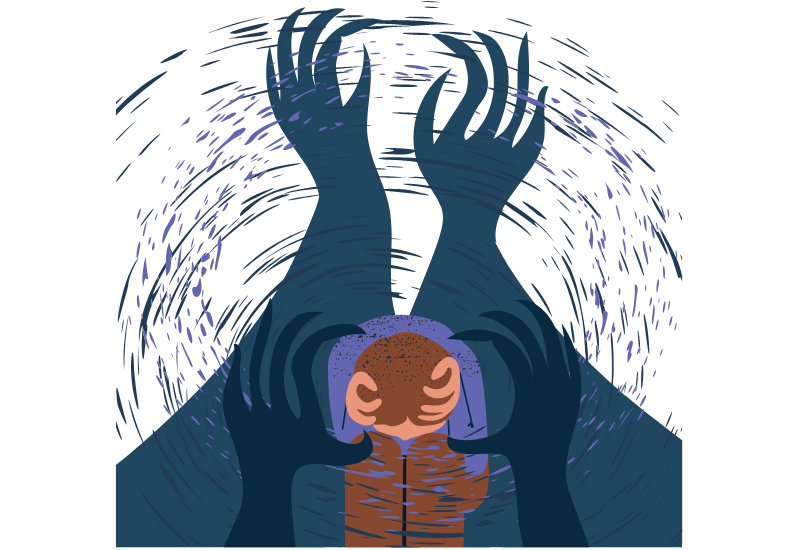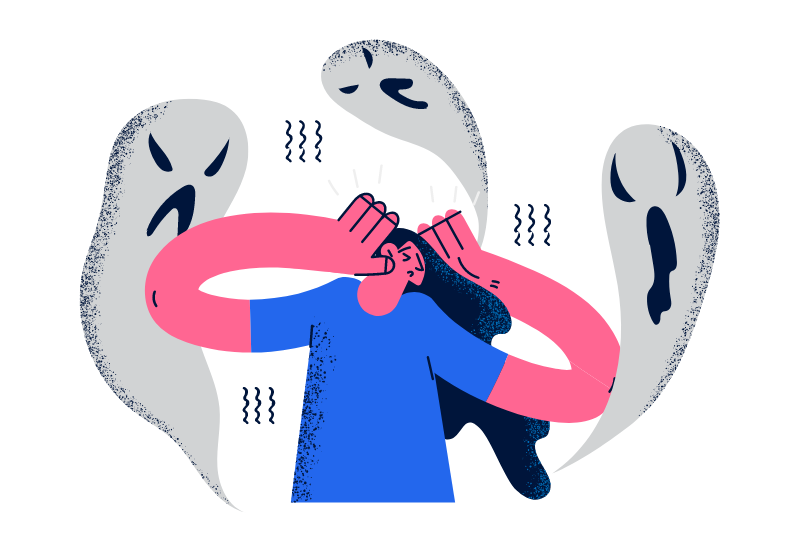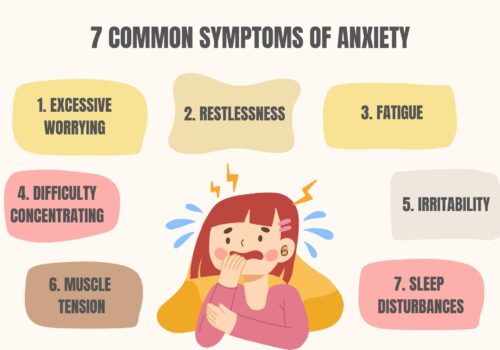According to the National Institute of Mental Health, aka NIH, phobia is a common anxiety disorder that most US citizens suffer from. 12.5% of US adult citizens encounter this mental illness during their lifetime. Besides, this is not a US-based illness. It can affect anyone from around the world. Having said that, in this post, we are going to talk about everything about phobias, such as symptoms, causes, types of phobias, and treatments. So, let us get started.
What is a Phobia?
Phobia can be described as an overwhelming and weakening fear of a place, object, situation, animal, or feeling. For instance, if someone is experiencing things such as fear of darkness, fear of heights, or other similar unnecessary fears, that person may indeed be suffering from a phobia. What you need to understand is that this fear is unrealistic and can become a severe mental illness if the patient does not receive the proper treatment. Also, studies show that women are more vulnerable to phobias than men.
How Does the Phobia Patient’s Brain Work?
The human brain is a complex place, and it acts in mysterious ways. For instance, there are special areas of the brain that store and recall unsafe or potentially fatal events. If you experience such an event in your life, the brain reactivates those unpleasant and stressful memories. This causes your body to re-experience the same reaction.
For phobia patients, the above reaction happens regularly. So, they have to re-experience those unpleasant and stressful memories over and over again. Eventually, it will mess up their entire lifestyle.
Common Symptoms of Phobias
One might think, How can I identify a phobia. Do not worry. There are several symptoms that indicate this anxiety disorder. Some people will not experience the symptoms until they come across the source of the phobia. For instance, if you have Arachnophobia, you might not experience any symptoms until you encounter a spider. Arachnophobia means fear of the spiders. So, it is always a good idea to know about the symptoms of phobias. Having said that, here are some common symptoms of phobias. Regardless of the type of phobia, you might encounter these symptoms.
- A feeling of uncontrollable anxiety, which happens due to contact with the source of fear
- The phobia patients will get a strong feeling to avoid the source of fear.
- After exposure, the patient won’t be able to do regular activities properly.
- The phobia patients might experience sweating, trembling, choking sensation, accelerated heartbeat, chest tightness or pain, dry mouth, confusion, dizziness, and abnormal breathing patterns.
If you experience the above symptoms suddenly, it might be phobia. Besides, you might not encounter the source of the phobia regularly. So, these symptoms might occur from time to time. That means it will not affect your daily life that much.
However, if you are suffering from a complex phobia, your daily life might become little difficult. we will talk about the complex phobias in the next section.

Types of Phobias
There are three distinct types of phobias. These phobias can show different symptoms and affect the patient in several ways.
- Specific Phobia
- Social Phobia
- Agoraphobia
From the above three, Social Phobia and Agoraphobia can be placed under the Complex Phobia category. On the other hand, Specific Phobia is also known as Simple Phobia.
Specific Phobia
Simple or specific phobia revolved around a particular animal, object, activity, or situation. A specific phobia develops during adolescence or childhood. With age, this phobia can develop into a less severe mental illness. However, that does not mean you can take the situation lightly. Whenever someone shows symptoms, they should take proper treatment soon as possible.
Examples for Specific Phobia
Here are different specific phobia types. You will get a better idea about specific phobias from the below list.
- Ophidiophobia: Fear of specific animals such as spiders
- Trypanophobia: Fear of harmful objects such as injections
- Ablutophobia: Fear of situations such as bathing or washing
Symptoms of Specific Phobia
Even though earlier we discussed the common symptoms of phobia, these symptoms might vary depending on the type of the phobia. So, here are common symptoms that indicate specific phobia.
- Lightheaded or dizziness
- Feelings of Imminent doom
- Diarrhea and nausea
- Ringing sound in your ears
Those who suffer from a specific phobia, has the habit of avoiding the source of the phobia.
Social Phobia
Most people refer to this as a social anxiety disorder. If you are suffering from this disorder, you might feel anxious while participating in social activities. Fear of speaking in front of a large or small group of people is one of the key issues related to social phobia. In some severe cases, the patients might face difficulties while meeting friends or dining out. So, when identified, proper treatment is necessary. Besides, social anxiety disorder belongs to the complex phobia category.
Symptoms of Social Phobia
As you can understand social phobia is a completely different kind of phobia. So, you might experience a few different symptoms compared to other phobias.
- Blushing
- Sweating
- Feeling nauseous
- Trembling hands
Agoraphobia
In simple terms, agoraphobia is the fear of open spaces. But, in some cases, it gets more complex than that. For instance, imagine a situation where someone that has agoraphobia, stuck in a place where escaping is difficult or impossible. That person might suffer a panic attack or an even worse outcome. So, agoraphobia can be dangerous depending on the situation.
Symptoms of Agoraphobia
Agoraphobia is a complex type of phobia. You should understand the risks involved with this mental illness. Having said that, here are some common symptoms of agoraphobia.
- Sudden panic attack
- Rapid heartbeat
- Dizziness
Apart from that, someone that suffers from agoraphobia might need a close friend or family member to accompany them while going outside.
Causes of Phobias
When it comes to the causes of phobias, we cannot pinpoint an exact cause for this mental disorder. However, there are some causes that can develop phobias over time.
Past Traumas or Incidents
For an individual past trauma or incident can cause a major backlash, and sometimes it will have an everlasting effect. For instance, if you experience numerous turbulences while traveling on a plane at an early age, it might affect your flying capabilities. You might grow a fear of flying.
Sometimes, a kid that got bitten by a dog at an early age, might develop a fear of dogs, aka phobia of dogs.
From Childhood Environment
For a child, having a good environment while growing up is crucial. It can affect the child’s growth and many other things. For instance, depending on the environment, a child can develop a phobia. Here is how that can happen.
While growing up, the child might expose to anxious parents or guardian figures. Sometimes, those parents or guardians might be suffering from a phobia. After some time, the child might show the same anxious or worried personality. Eventually, it will result in a specific phobia. So, remember not to expose your child to a such situation.
Long Term Stress
Stress can cause a lot of mental health issues. Especially when you are dealing with long-term stress, it could cause conditions such as phobias. On the other hand, stress can cause depression and anxiety. So, long-term stress can reduce your ability to cope with certain situations. You will develop an anxious and fearful personality that is perfect for phobias. Avoiding long-term stress is the best option for your mental health.
Read – Why Stress Management is important for your health
Genetics Matters
Recent research shows that some people are less vulnerable to phobias than others. So, the problem is your genes. You cannot do anything about it. Or can you? Let us discuss that during the next section.
Treatment for Phobias
At this point of the post, you now have a good idea about symptoms, causes, and the several types of phobias. However, we cannot miss the treatment part. If you are worried about your phobia and looking for some treatment, this section will give you all the answers.
First, one thing needs to be said. Any type of phobia can be cured if treated correctly.
How to Treat a Simple Phobia?
If someone is suffering from a simple phobia, it can be cured using gradual exposure to that object, place, animal, or situation. For instance, fear of dogs can be cured by exposing the person to a dog. However, the exposing process should initiate slowly.
Note: Depending on the progress of the patient, treatment time might vary. With this method, some patient gets quick result more often.
How to Treat a Complex Phobia?
Giving treatment for complex phobias can take some time. On the other hand, some treatment processes can be a headache for most people. But these treatment methods work flawlessly. Here are some of the treatments for complex phobias.
- Psychotherapy
- Counseling
- Cognitive-behavioral therapy
As we said earlier, these treatment processes can be little hard to handle for some people. But, for complex phobia treatments above processes are necessary.
Cognitive-Behavioral Therapy
A therapist, doctor, or counselor can help a patient learn and understand phobia in various ways. In that process, the patient will be able to identify the source of the phobia correctly, which makes dealing with this mental disorder much easier. So, this whole process is known as cognitive-behavioral therapy. Furthermore, cognitive-behavioral therapy can teach a patient to control thoughts and feelings while he experiences phobia.
Medication for Phobias
Usually, to treat phobias, there is no medication. However, sometimes doctors give the following medication to people to deal with anxiety.
Antidepressants
These serotonin reuptake inhibitors are mostly prescribed to phobia patients. With this medication, the brain can adjust the serotonin levels which affect our mood. So, SSRI antidepressants are excellent medication for phobia.
Beta-Blockers
Beta-Blockers are a good treatment for the physical symptoms of anxiety. However, there are a few sides effects of this medication such as fatigue, upset stomach, cold fingers, and insomnia.
Tranquilizers
One of the best examples of tranquillizers is benzodiazepines. This medication is prescribed for people that have a phobia. Benzodiazepines are good for anxiety symptoms. However, this medication is not recommended for people who have a history of alcohol dependence.
Side Effects of Phobia Medications
You already know that a phobia patient is treated with anxiety medication. However, these anxiety medications can cause some side effects. So, here are those side effects.
- Fatigue
- Sleepiness
- Slow mental functioning
- Memory problem
- Blurred vision
- Dry mouth
- Final Takeaways
Given the circumstances, if you still think that phobias cannot be cured, you are dead wrong. Any type of phobia can be cured with proper treatments. However, start the treatment process early as possible. Never let this mental disorder grow. It can cause severe consequences.
















